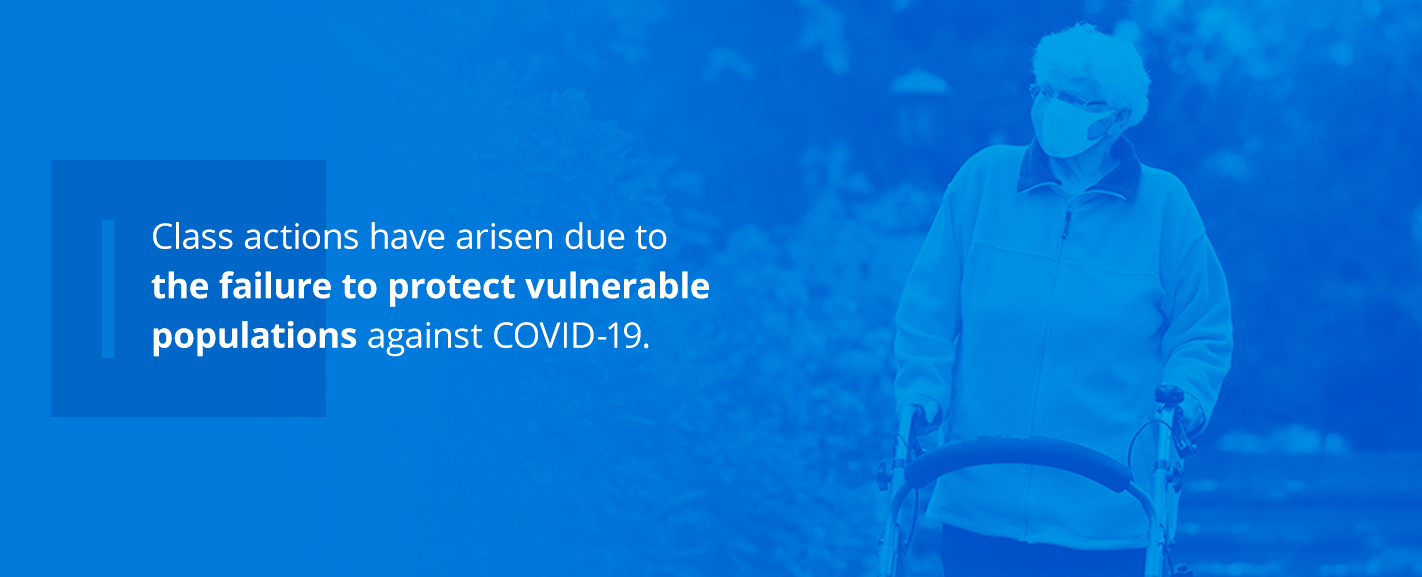
The COVID-19 pandemic has affected nearly every aspect of our lives, every industry, and the global economy. As a result, many class action claims have already been filed in United States courts. At The Phia Group, we are committed to keeping our clients up-to-date on developments in class action lawsuits during these uncertain times.
This guide to COVID-19 class action claims will cover some of the different types of class actions that have already commenced and those that may be filed in the future. For cost-containment consultation and assistance in class action recovery, you can trust us at The Phia Group.
Types of COVID-19 Class Action Claims
While specific allegations in the claims described below haven not yet been proven in court, they represent some of the different types of COVID-19 class action claims of which you should be aware.
Consumer Protection
Consumer protection class actions have arisen due to school trip cancellations, flight cancellations, and alleged misrepresentation in the manufacturing of hand sanitizer.
- School trip cancellations: Lawsuits have been filed against school trip providers due to their refusal to issue a full refund for trips canceled due to COVID-19. A clause in one of the provider’s contracts stated that the organization could issue a travel voucher instead of a refund when a tour is canceled for public health issues. In that case, the plaintiffs allege that this cancellation policy is unfair and imposes an unreasonable limitation on cash refunds.
- Flight cancellations: Lawsuits against airlines have escalated in recent weeks. In the U.S., airline passengers have claimed their airlines are refusing to honor their requests for ticket refunds after their flights were canceled and are instead offering the opportunity to rebook other flights or vouchers that expire in one year. The plaintiffs in these lawsuits are seeking full refunds and punitive damages.
- Misrepresentation of hand sanitizer: A consumer in California claims that Target misrepresented its store-brand hand sanitizer. The alleged misrepresentation lies in the phrase "kill 99.99% of germs," and the consumer claims this is not backed by reliable scientific studies. This class action is similar to other recent lawsuits filed against hand sanitizer manufacturers after the Food and Drug Administration sent a letter to one manufacturer about its marketing representations.

Insurance and Coverage
Businesses claim they have been denied insurance coverage for losses they sustained due to COVID-19. These claims against insurance companies have been escalating in recent months as the pandemic rages on. Plaintiffs have brought class actions against commercial insurance companies in the U.S., claiming their all-risk liability policies should cover a loss that a business incurs as a result of the COVID-19 pandemic.
Plaintiffs claim other insurance companies engaged in anti-competitive behavior and breach of contract by denying commercial insurance claims that arose because of the coronavirus outbreak. In light of the previous SARS pandemic, the plaintiffs claim that insurers cannot claim these events related to COVID-19 were unforeseen. After being forced to close businesses, plaintiffs are seeking compensatory damages due to being denied coverage.
Protecting the Vulnerable Against COVID-19
Additionally, class actions have arisen due to the failure to protect vulnerable populations against COVID-19, including the prison population and older adults living in long-term care facilities.
- Protecting the prison population: Class actions are being brought against prisons for allegedly failing to protect inmates and corrections staff from the coronavirus. In Illinois, a lawsuit has been brought against the state’s Department of Corrections director and against the state's governor to reduce Illinois's prison population. Older prisoners and prisoners with health problems are especially at risk due to prisons' poor protective measures.
- Protecting older adults in long-term care and residential facilities: Class actions are being brought against long-term care and residential facilities by residents who have been exposed to the coronavirus or by the estates of those who died as a result of a corporation's careless and negligent response to the pandemic. Pennsylvania's Department of Health is facing lawsuits for allegedly failing to regularly inspect these facilities and failing to stop facilities from using experimental treatments on their residents without their consent.
Labor and Employment
Labor and employment class actions have arisen due to alleged unlawful terminations, failure to protect union members, and misclassification of rideshare drivers as independent contractors.
- Employees allege unlawful terminations: Employees of multiple companies have claimed they have been unlawfully terminated and given inadequate notice. A restaurant chain faces similar allegations by its employees after restaurants closed due to the COVID-19 pandemic and workers were not given the required advance written notice. Hair salon employees allege that they were not paid for wages earned during the pay period that preceded the closures.
- States allegedly fail to protect union members: A class action has been brought against the state of Alaska by a union seeking injunctive relief due to the state’s alleged failure to protect union members from safety and health risks posed by the coronavirus. This lawsuit alleges that nonessential employees were not given the ability to telework and that the work environment was not well-adapted for social distancing measures. The plaintiffs have requested that the state be required to provide a safe work environment and enforce health mandates and safety policies.
- Rideshare drivers allege misclassification as independent contractors: Rideshare drivers have alleged that they were misclassified as independent contractors by their company and that, as a result, the company owed them paid sick leave. A lack of paid sick leave is especially harmful during the COVID-19 pandemic, and the plaintiffs claim the company has put the lives of drivers and the public in danger, as drivers feel pressured to continue working to maintain their pay, even when sick.
Potential Future Class Actions
As COVID-19 continues to spread and the effects of the pandemic become increasingly widespread, class action lawsuits will likely rise. Based on recent trends, we may be able to expect the following types of class actions in the future:
- Tort claims
- Securities claims
- Insurance claims
- Employment claims
- Breach of contract claims
- Consumer protection claims
- Corporate governance claims
- Data security and privacy claims
- Debt collection and banking claims
- Class actions against government entities

The Phia Group Can Help With Class Action Recovery
Do you need assistance with class action recovery? At The Phia Group, we are an experienced vendor of techniques for containing healthcare costs that include comprehensive consulting services, plan defense, plan document drafting, claim negotiation, overpayment, and subrogation recovery. These services are designed to protect plan assets and control costs.
We identify opportunities to recover more for your case. Client needs drive our flexible service options, and we provide unmatched results. Our mission is to reduce the cost of healthcare through flexible customer service, legal expertise, and innovative technologies. Contact us at The Phia Group to learn more about how we can help with class action recovery.